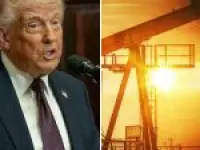
Rising Crude Oil Prices to Take a Toll on India
Rising crude oil prices, which hit $95 per barrel on Wednesday, have raised concerns about India”s current account deficit (CAD) and inflation. The Sensex and Nifty fell by 796 points (1.18%) and 231.90 points (1.15%), respectively, to close at 66800.84 and 19901.40 levels.
India is the third-largest crude oil consumer and one of the largest oil-importing countries. It imports nearly 84% of its crude oil needs, making the Indian oil market particularly vulnerable to price fluctuations in the international market.
Global benchmark Brent crude futures were up 28 cents at USD 94.71 a barrel by 1:02 p.m. EDT (1702 GMT) on Wednesday, having hit a session peak of USD 95.96 a barrel, their highest since November.
India”s merchandise trade gap had already widened to a 10-month high in August. The reason behind the oil price hike is production cuts made by Saudi Arabia and Russia. Increasing demand in China, the world”s largest oil consumer, is another reason.
Government Unlikely to Burden Common People
However, experts point out that the government may not burden common people with the rising oil prices as national and state elections are approaching. Instead, state-run fuel retailers are likely to bear the brunt of the impact.
This means that motorists are unlikely to feel a significant impact on their wallets. The government is not expected to announce an increase in pump prices by public sector fuel retailers, which dominate 90% of the market and have pricing freedom on paper.
Raising fuel prices at this juncture could lead to inflationary pressures, especially when signs of easing inflation are emerging. Moreover, it could provide an opportunity for the Opposition to target the ruling party in poll states.
Fuel Retailers in a Difficult Position
This would once again leave fuel retailers in a difficult position. The freeze on prices throughout 2022-23 resulted in a combined loss of Rs 21,000 crore for IOC, BPCL, and HPCL in the first half, as under-recovery on petrol and diesel reached Rs 12-14 per liter at one point.
Fuel prices have remained frozen since May 2022 when the Centre last reduced excise duty. Despite oil prices staying below $80 per barrel in recent months, rates were not reduced further. As previously reported by TOI, this decision was made to allow retailers to recover past losses and build a buffer for the future. However, with hefty first-quarter profits in their kitty, the Centre is likely to call for support once again, potentially making petrol and diesel sales unprofitable.
The falling rupee will further exacerbate this situation.
The rising crude oil prices are a major concern for the Indian economy. The government is in a difficult position, as it has to balance the need to protect consumers from inflation with the need to support state-run fuel retailers. It remains to be seen how the government will navigate this challenge.












